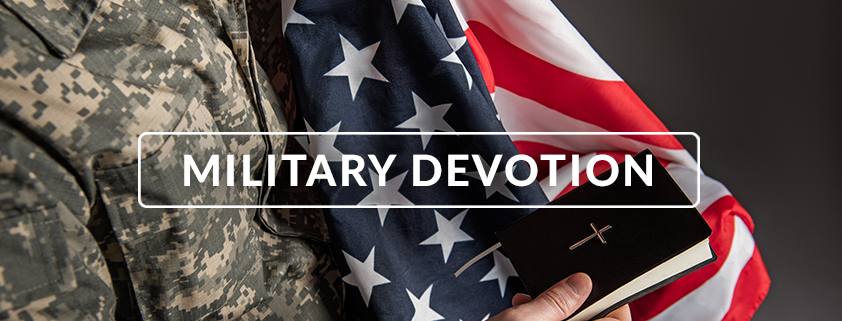God is Greater – September 15, 2023
God is Greater – September 15, 2023
If our hearts condemn us, God is greater than our hearts, and he knows everything.
1 John 3:20
Devotion based on 1 John 3:20
See series: Military Devotions
Sometimes, the easiest person to lie to is ourselves.
Too often we convince ourselves to believe things that deep down we know are not true. Usually, this is to escape facing truths that are unpleasant. We may decide we really don’t need to keep that dentist’s appointment. Or, an extra helping of ice cream doesn’t matter. And it won’t hurt to forget about exercising.
It’s just as easy to overlook our faults and minimize the seriousness of our failures. “Everybody does it!” “No one will notice!” “So what?”
With these excuses, we can try to justify everything from littering to stealing. There is hardly a limit to the lies we will tell ourselves to avoid guilty feelings.
But deep inside of us, there is a voice that calls out, “Liar!” We call that our conscience. It’s the law of God written in our hearts. It can be ignored. It can become weakened. But it has been placed there as a blessing.
We might compare it to a nerve in our jaw. If we did not get a toothache, we might never realize there was a problem with our tooth before it was too late.
If our conscience was not there to bother us, we might not know we were defying the law of God before it became too late. We need that warning written in our hearts. It helps us keep from lying to ourselves.
But what if our heart is lying to us?
In this setting, we aren’t talking about the muscle that pumps blood through our physical body. Instead, we are referring to the center and source of our whole inner life with its thinking, feeling, and wanting. We might describe it by saying, “This is who I am!”
The Bible’s first mention of our hearts carries these tragic words. “The LORD saw how great man’s wickedness on the earth had become, and that every inclination of the thoughts of his heart was only evil all the time” (Genesis 6:5).
That’s in contrast to what we learn about our Creator’s heart. “The LORD was grieved that he had made man on the earth, and his heart was filled with pain” (v.6).
The pain in his heart was coupled with love so great that he was willing to pay the price to cover the evil in our hearts. When the Holy Spirit worked saving faith within us, he gave us what he had promised. “I will give you a new heart and put a new spirit in you” (Ezekiel 36:26).
Yet, on this side of heaven, the evil side of our nature remains with us. We are reminded, “The sinful mind is hostile to God” (Romans 8:6).
What action can be more hostile to God than trying to convince a child of God that he is separated from the love of God?
The warning is clear. Our natural heart, our sinful heart, can lie to us. It can falsely condemn us. The accusation comes from deep inside. It can strip away our joy. It can lead us to despair.
In his epistle, John warns against a fake faith, an empty faith. He tells us, “This is how we know who the children of God are and who the children of the devil are: Anyone who does not do what is right is not a child of God; nor is anyone who does not love his brother” (1 John 3:10).
Those can be frightening words. Could we be a child of the devil instead of a child of God? Are we someone who “does not do what is right”? Of course! We know we sin.
Our heart can condemn us with these words if we let it. But that is not the final word.
Scripture declares, “Our God is greater than our hearts!”
He knows what’s in our souls. “He knows everything.”
That’s what the apostle Peter went back to. Yes, he had boasted that his faith was greater than that of any of the other disciples. Yes, he had claimed that he would die rather than deny Jesus was his Savior God.
And yes! Regarding Jesus, he did tell the servant girl, “I know not the man!” Then backed it up by cursing and swearing it was true.
But afterward, when face-to-face with the risen Jesus, he answered the question “Do you love me?” by saying, “Lord, you know all things; you know that I love you” (John 21:17).
God is greater than our fears. Greater than our weakness. Greater than an accusing heart. He sees the faith that is in our heart of hearts. His forgiveness is greater than our weakness.
Jesus says, “I am the good shepherd; I know my sheep and my sheep know me” (John 10:14).
Thus, we can say, “Be still, my soul! The Lord is on thy side!”
Prayer:
Hold me, O Lord, in the hollow of your hand. Cover my doubt always with your love. Amen.
Points to ponder:
- Why do we deny our need for forgiveness when it is offered as a gift?
- Why are we sometimes more willing to believe a lie than a truth?
- How has the loving God shown us his greater power?
Written and recorded by Rev. Paul Horn, WELS National Civilian Chaplain to the Military, San Diego, California.
All Scripture quotations, unless otherwise indicated, are taken from the Holy Bible, New International Version®, NIV®. Copyright ©1973, 1978, 1984, 2011 by Biblica, Inc.™ Used by permission of Zondervan. All rights reserved worldwide. Note: Scripture reading footnotes are clickable only in the web version.

